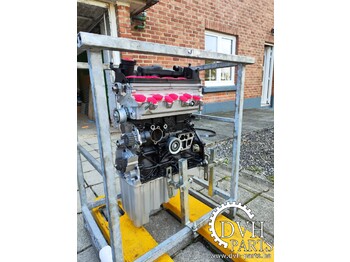Top-notch Amarok Engine for Sale-- Take A Look At Our Exclusive Array and Offers
Top-notch Amarok Engine for Sale-- Take A Look At Our Exclusive Array and Offers
Blog Article
Important Considerations and Tips for Picking the Right Engine for Your Needs
Selecting the ideal engine is a multifaceted decision that needs mindful factor to consider of numerous elements to make certain optimum performance for your details requirements. The ins and outs of engine choice extend beyond these basics, triggering a more detailed exam of critical components that can eventually influence your fulfillment and success.
Determine Your Purpose
Identifying your purpose is an important initial step in picking the appropriate engine for your demands. Understanding the details application you desire will lead your decision-making process and make sure that you select an engine that lines up with your operational requirements. Whether you require an engine for a commercial automobile, industrial equipment, or an entertainment task, each situation demands different performance attributes and capabilities.
Think about the environment in which the engine will operate. Will it undergo hefty lots, severe temperatures, or extended use? Examining these variables will certainly help you determine the necessary power outcome, gas efficiency, and longevity needed to meet your goals.
Furthermore, think of the lasting ramifications of your option. Budget restrictions, maintenance requirements, and availability of components are vital factors to consider that will influence your overall fulfillment and functional effectiveness.
Inevitably, verbalizing your objective will certainly streamline the option procedure and encourage you to make an informed decision. By clearly defining your goals, you can assess potential engines more properly and choose one that not just satisfies your current demands yet likewise sustains your future goals.
Evaluate Engine Specs
When you have plainly verbalized your objective, the following step is to evaluate engine requirements. This procedure includes an extensive exam of numerous technical details that can dramatically impact performance and viability for your intended usage.
Begin by evaluating the engine's horsepower and torque rankings. Horse power is essential for identifying the engine's capacity to do work, while torque is vital for understanding just how well it can deal with hefty tons or velocity. Furthermore, take into consideration the engine displacement, as it frequently correlates with power result and efficiency.
Following, check out the engine typeâEUR" whether it is a fuel, diesel, or different gas engineâEUR" as each type has distinctive characteristics and applications. Pay attention to the engine's setup (e.g., inline, V-type), as this can influence dimension, weight, and general performance.
An additional vital aspect is the engine's cooling system, which can affect reliability and upkeep needs. Lastly, examine the maker's reputation and warranty offerings, as these can give insights right into lasting performance and assistance. Completely evaluating these specs will help guarantee that you pick an engine that straightens with your specific requirements and functional goals.
Take Into Consideration Fuel Efficiency
Fuel efficiency is an essential element to take into consideration when choosing an engine, as it straight affects functional prices and environmental sustainability. An engine's fuel efficiency is normally gauged in miles per gallon (MPG) for cars or in details gas intake (SFC) for aircraft and aquatic engines. Greater gas performance not just decreases the quantity of gas taken in however also reduces greenhouse gas discharges, making it an accountable choice for eco-conscious customers.
When reviewing engine options, it is important to evaluate the driving problems and planned usage. Engines optimized for freeway driving might exhibit better gas effectiveness compared to those created for stop-and-go traffic. Furthermore, think about the engine's technology, such as turbocharging or hybrid systems, which can substantially improve gas performance.
Assess Upkeep Requirements

Begin by examining the supplier's recommended maintenance periods and procedures. Some engines might call for even more constant oil adjustments, filter replacements, or specialized servicing, which can influence your operational downtime. Additionally, take into consideration the schedule of parts and the ease of getting them. Engines with extensive popularity usually have bulks accessibility, lowering lead times during repair work.
Another essential facet is the technological know-how needed for upkeep. Some engines might necessitate specialized training for professionals, which can limit your alternatives for solution suppliers. Examine whether the engine's design allows for easy accessibility to components frequently requiring upkeep, as this can considerably influence labor expenses.
Spending Plan Your Investment
Understanding upkeep requirements is just one aspect of choosing the appropriate engine; monetary considerations play a similarly vital function (amarok engine for sale). Developing a clear budget plan is crucial, as it affects not only the first acquisition price yet likewise long-lasting functional prices
When budgeting, consider both the recurring expenses and in advance expenses such as gas efficiency, maintenance, and potential fixings. A seemingly economical engine may sustain greater expenses over time because of poor fuel economic climate or frequent maintenance requirements. In addition, assess the availability and price of extra components, in addition to the warranties supplied by producers, which can supply financial defense versus unforeseen costs.
It is likewise wise to factor in prospective funding options or renting setups, which could discover here relieve immediate economic concerns. Stabilize your desire for sophisticated attributes with your spending plan restrictions, guaranteeing that you spend in an engine that satisfies your efficiency needs without endangering monetary security.
Eventually, an all-around budget plan will equip you to make enlightened choices, aligning your engine option with both your operational demands and economic capabilities, causing a more sustainable financial investment in the long run.

Final Thought
In final thought, choosing the ideal engine demands a complete understanding of certain demands and applications. Cautious examination of engine requirements, gas effectiveness, and upkeep requirements is crucial for educated decision-making.
Fuel over at this website performance is a crucial aspect to think about when choosing an engine, as it straight affects operational prices and ecological sustainability. An engine's fuel performance is normally measured in miles per gallon (MPG) for cars or in particular gas consumption (SFC) for airplane and marine engines. Diesel engines typically provide better fuel performance than gasoline engines. Inevitably, selecting an engine with a strong focus on fuel effectiveness can lead to substantial long-term savings and add positively to ecological efforts. Cautious evaluation of engine specs, gas efficiency, and maintenance demands is necessary for educated decision-making.
Report this page